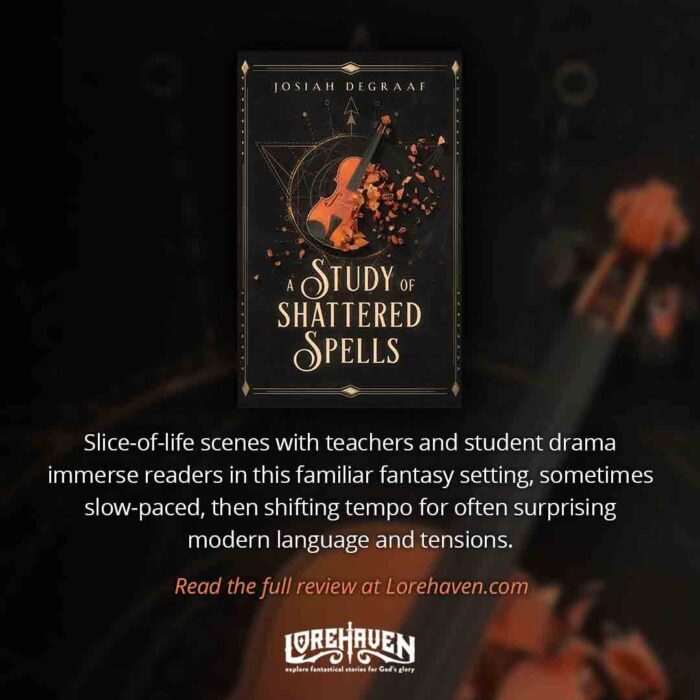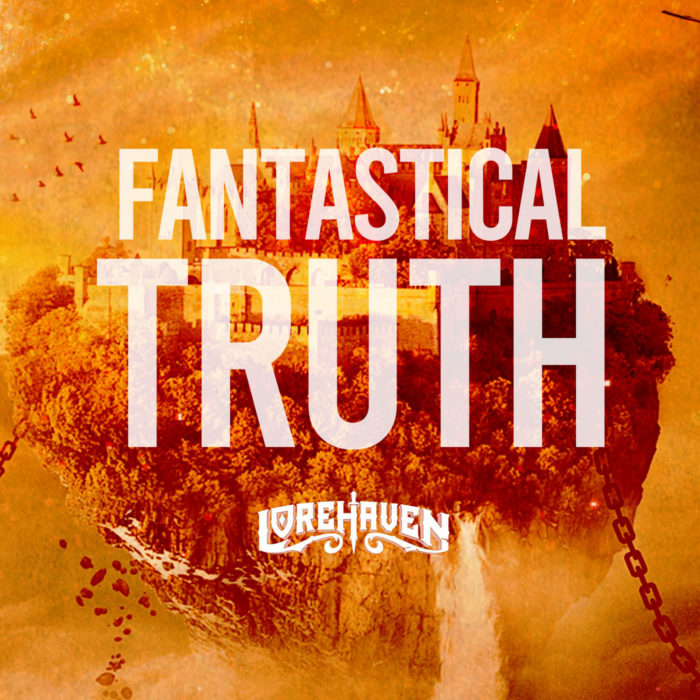77. Creator, Evangelist, or Worshiper—What’s Our One Job When We Enjoy Stories? | Fiction’s Chief End, part 4
Podcast: Play in new window | Download (Duration: 1:14:48 — 35.6MB) | Embed
Last month at Lorehaven, readers were buzzing about a two-part article series from Josiah DeGraaf, which we called Should Christians Cancel Woke Stories? In short, Josiah suggests Christians must watch our for our own propaganda, and approach stories not as “culture warriors” but as students. That raises a big question hiding behind many readers’ questions about the series. When we’re enjoying stories, who are we supposed to be? Before we talk about our added callings as story creators, evangelists, or even students, what is our one job?
Concession stand
- Effectively this is part 4 of our Fiction’s Chief End episode series.
- We’ll build on the “fiction’s chief end” series and lots of other articles.
- We’ll respond to some readers who have commented, though in general.
- We’re assuming mature Christian listeners here, not kids or new Christians.
- We assume a biblical view about the question “what is the chief end of man”?
- None of this speaks against anyone’s job as story creator or evangelist.
- Yet we do try to put first things first, which means: (1) God, (2) others, and (3) you!
- Unless we get this right, all our fiction happiness and holiness will go askew.
What is the chief end of fan?
- People in memes have showed examples of failure to say “you had one job.”
- Here’s our big question: What’s our one job when we enjoy stories?
- A more-recent meme phrase is “X does/doesn’t understand the assignment.”
- Our big purpose: we must understand our first assignment from God.
- Only when we get this can we better sort out propaganda and “clean” stories.
- Now let’s specifically explore our assumed first jobs: as author or evangelist.
1. Fan’s chief end is … to be an author?
- First, some “inside baseball.” (We got this a lot at the original Speculative Faith.)
- In articles, comments, and everywhere, people assumed author identities.
- When Stephen began editing more often, he began to push back against this.
- If we’re all authors, where are the readers? We’re stuck in an echo chamber.
- If we’re always talking “inside author baseball,” we kinda deserve obscurity.
- For practical and doctrinal reasons, Stephen resists the authorial-voice impulse.
- Even in secular views, if we aren’t fans first, we’re going to lose happiness!
- We’ll end up just manufacturing stories—raiding others’ stories for parts.
- That impulse leads to novels and movies that most fans simply don’t enjoy.
- Here’s one tell: when people speak of “telling” rather than “enjoying” a story.
- With Josiah’s articles, some people reacted not as fans but authors.
- Using his framing, people wanted to think as teachers but not as students.
- Good teachers, however, know they themselves can never stop learning.
- Or as Jesus said, he who would be first must be last. We lead as servants.
- That leads to the more spiritual version of this leader-obsessed approach.
2. Fan’s chief end is … to be an evangelist?
- We could have a whole set of new concessions about this identity.
- God does call us all to evangelism, just like he calls some to create stories.
- But is our prime directive, our “chief end” only to evangelize readers?
- That’s a big assumption behind some pushback to Josiah’s two articles.
- Unless we address that, even our “no propaganda!” calls are propaganda.
- This is why even the “student” identity is limited. We aren’t always in school!
- This approach also leads to some assumptions about “clean” fiction.
- “I must ensure this story is ‘clean’ so that someone won’t be tempted to sin.”
- Well, what if we ensured stories are truthful so someone isn’t tempted to scoff?
- Even assuming evangelism, more real-life people need more realistic stories.
- We get that some fans just want to relax and not always be on their guard.
- That’s exactly why we must challenge the “my one job is evangelism” view.
3. Fan’s chief end is to glorify God and enjoy Him forever, using stories.
- Yes, all stories can help instruct authors. But receive a story! Don’t just Use it!
- Yes, all stories have messages. But the best stories don’t feel like evangelists.
- Rather, the best stories help you become a more Christlike worshiper of God.
- Then the best stories help you engage the world of neighbors around us.
Fans must worship God
- My chief end is not writing, evangelism, or even being a good neighbor.
- My chief end is to glorify God in all ways, first by thanking/worshiping Him!
- This is the doctrine of vocation. I can worship God even if I don’t talk of him.
- Story-enjoyment is vocation. Stories can glorify Him in beauty, not just truth.
- When we receive (not just Use) good stories, we must start with gratitude.
- It’s about God, but of course this benefits you as a fan (not first an author).
Fans must engage others
- The best Christian stories feel like a friend sharing his/her honest life story.
- You’ll find questionable ideas in the story. You’ll listen with discernment.
- Still we must first listen, and not only think about what we will say next.
- So put down the pen. Put down your pulpit. Listen with happiness/holiness.
- After that you might apply stories to evangelism or creating. But only later.
Com station
David wrote to us about episode 76:
Everything you said Zach was so on point! What an opportunity to share the gospel if we see cancel culture as an atonement theory. Unrelated, I have a question. I’m reading a crime thriller and wondering how this glorifies God. Is there guidance for how to enjoy a book to the glory of God, even a gruesome one? Is it really as simple as praying or talking to God about what you’ve read once you’ve read it? Thanking him for the excitement you feel? Reflecting on real people in similar situations?
Next on Fantastical Truth
What if you hated the idea of Peter Pan, then learned that your very skin sheds the fairy dust you need for traveling to Neverland? That’s the magical start of Kara Swanson’s Heirs of Neverland series, which began last year with the fantasy novel Dust. That book won three awards at Realm Makers 2021, and next week Kara Swanson will stop by and help us fly here on Fantastical Truth.
Sponsor: A. J. Chamberlain’s thriller novel Cain’s Redemption
Cain’s Redemption is the new Christian thriller from A. J. Chamberlain and the sequel to Urban Angel.
Winning the battle is not the same as winning the war.
Alex Masters is pursuing her dreams and Daisy has overcome her demons, but the enemy does not rest, and he is desperate to atone for his mistakes. Out of that desperation, a new plan emerges that is fashioned to exploit the weaknesses of his opponents.
But even as the enemy’s plans unfold, so does the potential for love. This love may fulfill its destiny: but first it must survive, and for that to happen there must be redemption.
One reviewer of Urban Angel said:
I was so immersed in this book I felt I was there walking every step with the characters. It made me think about my Christian faith and the way in which God is always nearby. I cannot recommend this book highly enough and eagerly await book 2 in the series.
Cain’s Redemption releases Sept. 3, available in paperback and ebook.


































Welp, isn’t this all as clear as mud. For as much as this might be intended to serve as a Article Zero or Article Point Five, it still feels a bit reductionist. To use the hats metaphor, we all know that we all wear many different hats, but I don’t feel the need to put a hierarchy on the hats, but ask what each hat might bring to the discussion. But I am admittedly a follower of the postmodernist school of reading where it’s all thrown in the pot and stirred until something falls out (and then you argue about what that thing is and what it means).
Also I might argue that stories are not necessarily a deep-seated want in of themselves, that we have a deep-seated want for meaning, and we largely achieve that by means of the stories we tell ourselves.
But also, mostly unrelated, there’s a lot to unpack in these little side bits about people trying to gain authority by the Teacher, or the Evangelist or the Author, and how that relates to an authoritarian culture, but that’s my psychological/sociological nerd hat talking.
Also also: is “deconstruction” becoming a new negative buzz word, like “canceling”? Why? Admittedly I’m biased because I love deconstruction.
Also PSSS: I think Dune is one of those books that has cool ideas but largely unlikeable characters so I can’t really give a rat about the plot.
Thanks for listening!
We are certainly approaching this from a biblical worldview. And Scripture does put a “hierarchy” on the hats when it says the first and greatest commandment is to love the Lord your God with all your heart, mind, soul, and strength. Neighbor-love commandments are second. By the way, this prioritization helps prevent some bad Christian habits like grabbing made-up traditions to try to impress people, and then acting as if that’s the heart of gospel faith when it’s really not.
“Deconstruction” is indeed a buzzword. I give it about three more years of top-shelf life.
I found the article on TGC you recommended about J Mark Bertrand. It’s called “Christian Artists Tell the Truth About the World”. It’s from Sept 2016, by Phil Wade. Thank you for sending me to it!
A rather indirect sending! Glad you found it. ‘Twas on my list this week to circle back and look that up, then see about emailing that to you. Here’s the link: The Gospel Coalition, Sept. 16, 2013.